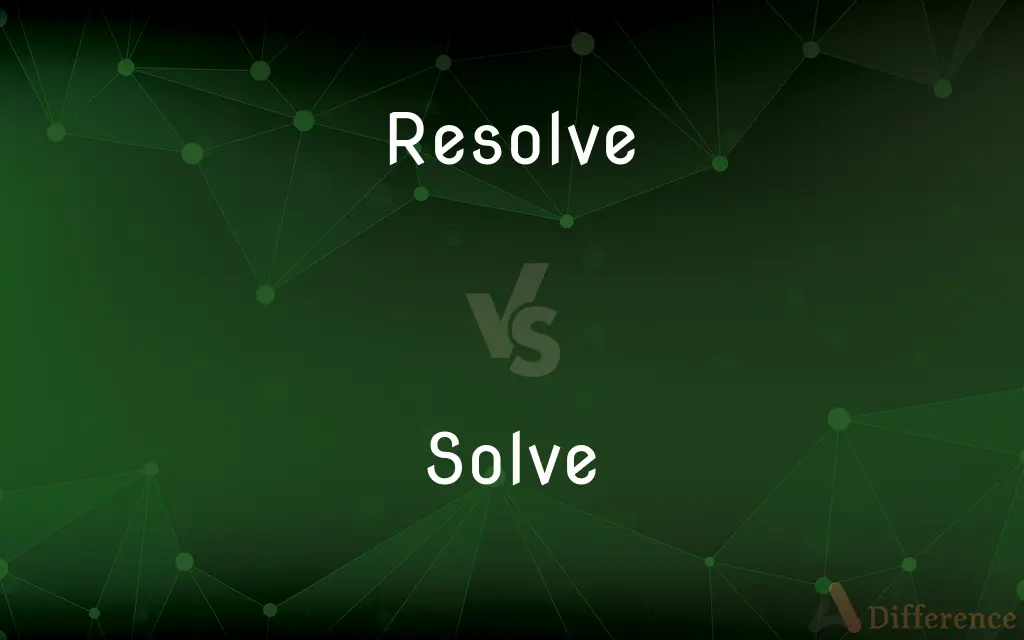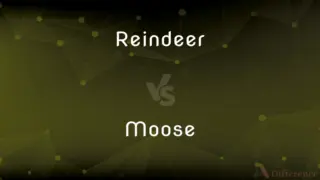Resolve vs. Solve — What's the Difference?
By Tayyaba Rehman & Urooj Arif — Updated on March 20, 2024
Resolve involves deciding on a course of action or finding a solution to a debate or dilemma, while solve focuses on finding an answer to a problem, especially in mathematics or puzzles.

Difference Between Resolve and Solve
Table of Contents
ADVERTISEMENT
Key Differences
Resolve is often used in contexts where there is a need to make a firm decision or find a solution to conflicts and disputes, indicating a process of deliberation and determination. Whereas, solve is primarily used when dealing with problems or questions that require a logical or systematic answer, especially in academic or technical fields.
When resolving an issue, one might consider various factors such as personal values, emotions, and the interests of all parties involved, highlighting the complexity and multidimensional nature of the process. On the other hand, solving a problem often involves applying specific methodologies or formulas, emphasizing a more linear and logical approach.
Resolve can also imply the act of breaking down something complex into its constituent parts to better understand or address it, focusing on analysis and decomposition. Whereas, solve is more about arriving at a definitive answer or conclusion, often without needing to dissect the problem into smaller components.
In interpersonal or political contexts, resolving issues often requires negotiation, compromise, and the ability to empathize with different perspectives. In contrast, solving a mathematical equation or scientific problem relies on objective criteria and empirical evidence, underscoring the difference in the nature of challenges each verb addresses.
The outcome of resolving a situation might not always be a single solution or answer, but rather a consensus or agreement that satisfies all parties involved. Meanwhile, solving a problem typically results in a clear, unambiguous answer or solution, reflecting the goal-oriented nature of the activity.
ADVERTISEMENT
Comparison Chart
Context
Decisions, conflicts, personal dilemmas
Mathematical, logical, or technical problems
Approach
Deliberative, often requires negotiation
Systematic, applying methodologies or formulas
Emphasis
Analysis, understanding, consensus-building
Finding definitive answers or solutions
Outcome
May result in a decision or agreement
Results in a clear, unambiguous solution
Required Skills
Negotiation, empathy, analytical thinking
Logical reasoning, technical expertise
Compare with Definitions
Resolve
To come to a definite or earnest decision about.
She resolved to follow a healthier diet.
Solve
To find an answer to, explanation for, or means of effectively dealing with (a problem or mystery).
They solved the complex puzzle in minutes.
Resolve
To clear up or resolve (an uncertainty).
The meeting resolved many uncertainties about the project's future.
Solve
To resolve or work through (emotional or psychological issues) systematically.
He solved his feelings of guilt through therapy.
Resolve
To settle or find a solution to (a problem or contentious matter).
The board resolved the disputes between the departments.
Solve
To work out a correct solution to (a problem).
She solved the math equation effortlessly.
Resolve
To decide firmly on a course of action.
He resolved that he would start exercising regularly.
Solve
To find the answer or explanation for; clear up; explain.
Scientists strive to solve the mysteries of the universe.
Resolve
To break down or separate into constituent parts for analysis.
The committee resolved the large task into smaller, manageable tasks.
Solve
To clear up; to find the solution to.
The detective solved the case after years of investigation.
Resolve
To make a firm decision about
Resolved that I would do better next time.
Solve
To find an answer to, explanation for, or way of dealing with (a problem, for example).
Resolve
To decide or express by formal vote
The legislature resolved that the official should be impeached.
Solve
To solve an equation
Insert the values of the constants and solve for x.
Resolve
To cause (a person) to reach a decision
"He was resolved to enjoy the success he had earned" (F. Scott Fitzgerald).
Solve
To find an answer or solution to a problem or question; to work out.
Resolve
To change or convert
My resentment resolved itself into resignation.
Solve
To find out the perpetrator, the motive etc of crime
To solve a murder
To solve a crime
Resolve
To find a solution to; solve
Resolved the problem.
Solve
(mathematics) To find the values of variables that satisfy a system of equations and/or inequalities.
Resolve
To remove or dispel (doubts).
Solve
(mathematics) To algebraically manipulate an equation or inequality into a form that isolates a chosen variable on one side, so that the other side consists of an expression that may be used to generate solutions.
Resolve
To bring to a usually successful conclusion
Resolve a conflict.
Solve
(transitive) To loosen or separate the parts of.
Resolve
(Medicine) To cause reduction of (an inflammation, for example).
Solve
A solution; an explanation.
Resolve
(Music) To cause (a tone or chord) to progress from dissonance to consonance.
Solve
To explain; to resolve; to unfold; to clear up (what is obscure or difficult to be understood); to work out to a result or conclusion; as, to solve a doubt; to solve difficulties; to solve a problem.
True piety would effectually solve such scruples.
God shall solve the dark decrees of fate.
Resolve
(Chemistry) To separate (an optically inactive compound or mixture) into its optically active constituents.
Solve
A solution; an explanation.
Resolve
To render parts of (an image) visible and distinct.
Solve
Find the solution to (a problem or question) or understand the meaning of;
Did you solve the problem?
Work out your problems with the boss
This unpleasant situation isn't going to work itself out
Did you get it?
Did you get my meaning?
He could not work the math problem
Resolve
(Mathematics) To separate (a vector, for example) into coordinate components.
Solve
Find the solution;
Solve an equation
Solve for x
Resolve
(Archaic) To separate (something) into constituent parts.
Solve
Settle, as of a debt;
Clear a debt
Solve an old debt
Resolve
(Obsolete) To cause (something) to melt or dissolve
"O, that this too too solid flesh would melt / Thaw and resolve itself into a dew!" (Shakespeare).
Resolve
To reach a decision or make a determination
Resolve on a course of action.
Resolve
To become separated or reduced to constituents.
Resolve
(Music) To undergo resolution.
Resolve
Firmness of purpose; resolution
"my fierce, indignant resolve to visit those sun-kissed islands" (Caitlin Flanagan).
Resolve
A determination or decision; a fixed purpose
"She had come to a resolve to undertake outdoor work in her native village" (Thomas Hardy).
Resolve
A formal resolution made by a deliberative body.
Resolve
(transitive) To find a solution to (a problem).
Resolve
(transitive) To reduce to simple or intelligible notions; to make clear or certain; to unravel; to explain.
To resolve a riddle
Resolve
(intransitive) To make a firm decision to do something.
I resolve to finish this work before I go home.
Resolve
(transitive) To determine or decide in purpose; to make ready in mind; to fix; to settle.
He was resolved by an unexpected event.
Resolve
To come to an agreement or make peace; patch up relationship, settle differences, bury the hatchet.
After two weeks of bickering, they finally resolved their differences.
Resolve
To break down into constituent parts; to decompose; to disintegrate; to return to a simpler constitution or a primeval state.
Resolve
To cause to perceive or understand; to acquaint; to inform; to convince; to assure; to make certain.
Resolve
(music) To cause a chord to go from dissonance to consonance.
Resolve
(optics) To render visible or distinguishable the parts of something.
Resolve
(computing) To find the IP address of a hostname, or the entity referred to by a symbol in source code; to look up.
Resolve
To melt; to dissolve; to liquefy or soften (a solid).
Resolve
To melt; to dissolve; to become liquid.
Resolve
To liquefy (a gas or vapour).
Resolve
To disperse or scatter; to discuss, as an inflammation or a tumour.
Resolve
(obsolete) To relax; to lay at ease.
Resolve
(chemistry) To separate racemic compounds into their enantiomers.
Resolve
To solve (an equation, etc.).
Resolve
(uncountable) Determination; will power.
It took all my resolve to go through with the surgery.
Resolve
(countable) A determination to do something; a fixed decision.
Resolve
(countable) An act of resolving something; resolution.
Resolve
To separate the component parts of; to reduce to the constituent elements; - said of compound substances; hence, sometimes, to melt, or dissolve.
O, that this too too solid flesh would melt,Thaw, and resolve itself into a dew!
Ye immortal souls, who once were men,And now resolved to elements again.
Resolve
To reduce to simple or intelligible notions; - said of complex ideas or obscure questions; to make clear or certain; to free from doubt; to disentangle; to unravel; to explain; hence, to clear up, or dispel, as doubt; as, to resolve a riddle.
To the resolving whereof we must first know that the Jews were commanded to divorce an unbelieving Gentile.
Resolve
To cause to perceive or understand; to acquaint; to inform; to convince; to assure; to make certain.
Sir, be resolved. I must and will come.
Resolve me, Reason, which of these is worse,Want with a full, or with an empty purse?
In health, good air, pleasure, riches, I am resolved it can not be equaled by any region.
We must be resolved how the law can be pure and perspicuous, and yet throw a polluted skirt over these Eleusinian mysteries.
Resolve
To determine or decide in purpose; to make ready in mind; to fix; to settle; as, he was resolved by an unexpected event.
Resolve
To express, as an opinion or determination, by resolution and vote; to declare or decide by a formal vote; - followed by a clause; as, the house resolved (or, it was resolved by the house) that no money should be apropriated (or, to appropriate no money).
Resolve
To change or convert by resolution or formal vote; - used only reflexively; as, the house resolved itself into a committee of the whole.
Resolve
To solve, as a problem, by enumerating the several things to be done, in order to obtain what is required; to find the answer to, or the result of.
Resolve
To dispere or scatter; to discuss, as an inflammation or a tumor.
Resolve
To let the tones (as of a discord) follow their several tendencies, resulting in a concord.
Resolve
To relax; to lay at ease.
Resolve
To be separated into its component parts or distinct principles; to undergo resolution.
Resolve
To be settled in opinion; to be convinced.
Let men resolve of that as they plaease.
Resolve
To form a purpose; to make a decision; especially, to determine after reflection; as, to resolve on a better course of life.
Resolve
The act of resolving or making clear; resolution; solution.
Resolve
That which has been resolved on or determined; decisive conclusion; fixed purpose; determination; also, legal or official determination; a legislative declaration; a resolution.
Nor is your firm resolve unknown.
Cæsar's approach has summoned us together,And Rome attends her fate from our resolves.
Resolve
The trait of being resolute; firmness of purpose;
His resoluteness carried him through the battle
It was his unshakeable resolution to finish the work
Resolve
A formal expression by a meeting; agreed to by a vote
Resolve
Bring to an end; settle conclusively;
The case was decided
The judge decided the case in favor of the plaintiff
The father adjudicated when the sons were quarreling over their inheritance
Resolve
Reach a conclusion after a discussion or deliberation
Resolve
Reach a decision;
He resolved never to drink again
Resolve
Understand the meaning of;
The question concerning the meaning of life cannot be answered
Resolve
Make clearly visible;
Can this image be resolved?
Resolve
Find the solution;
Solve an equation
Solve for x
Resolve
Cause to go into a solution;
The recipe says that we should dissolve a cup of sugar in two cups of water
Common Curiosities
Can a conflict be solved instead of resolved?
Conflicts are generally resolved through negotiation and understanding, rather than solved, as they often involve complex human emotions and relationships.
What is required to effectively resolve an issue?
Effectively resolving an issue requires understanding, empathy, negotiation skills, and sometimes compromise.
Can both resolve and solve be used interchangeably?
While sometimes used interchangeably in casual conversation, "resolve" is more appropriate for decisions and conflicts, and "solve" for logical or technical problems.
Is it possible to resolve a mathematical problem?
While mathematical problems are typically solved, one could use "resolve" metaphorically to mean breaking down a problem into solvable parts.
Is solving a problem always objective?
Yes, solving a problem typically involves objective criteria and methodologies, especially in fields like mathematics or science.
What does it mean to solve a dispute?
Solving a dispute usually refers to finding a logical end or resolution, though "resolve" is more commonly used in this context.
What does it mean to resolve a situation?
To resolve a situation means to find a satisfactory way of dealing with a problem or difficulty, often involving decision-making or negotiation.
What skills are necessary to solve mathematical problems?
Solving mathematical problems requires logical reasoning, knowledge of mathematical formulas, and sometimes creativity.
Can a problem have multiple solutions?
Yes, especially in creative or theoretical contexts, a problem can have multiple solutions; however, in mathematics, there is often a single correct answer.
How do emotions play into resolving issues?
Emotions significantly influence resolving issues, as understanding and empathizing with different perspectives is crucial.
Can a solution be both resolved and solved?
In some contexts, especially interdisciplinary ones, a solution might involve both resolving (through decision-making) and solving (through logical analysis).
Can a scientific problem be resolved?
Scientific problems are typically solved through empirical research and logical reasoning, but resolving might be used when discussing the broader implications or applications of the solution.
How does one approach solving a technical problem?
Solving a technical problem involves applying specific knowledge, methodologies, and logical reasoning to find a solution.
What's the difference between solving a mystery and resolving a mystery?
Solving a mystery involves uncovering the truth through evidence, whereas resolving a mystery is less commonly used and might imply dealing with the implications of the mystery.
Why is negotiation important in resolving issues?
Negotiation is important in resolving issues because it allows for different parties to find a mutually satisfactory agreement or decision.
Share Your Discovery

Previous Comparison
Reindeer vs. Moose
Next Comparison
Mesa vs. PlateauAuthor Spotlight
Written by
Tayyaba RehmanTayyaba Rehman is a distinguished writer, currently serving as a primary contributor to askdifference.com. As a researcher in semantics and etymology, Tayyaba's passion for the complexity of languages and their distinctions has found a perfect home on the platform. Tayyaba delves into the intricacies of language, distinguishing between commonly confused words and phrases, thereby providing clarity for readers worldwide.
Co-written by
Urooj ArifUrooj is a skilled content writer at Ask Difference, known for her exceptional ability to simplify complex topics into engaging and informative content. With a passion for research and a flair for clear, concise writing, she consistently delivers articles that resonate with our diverse audience.














































